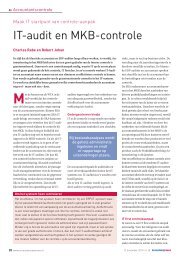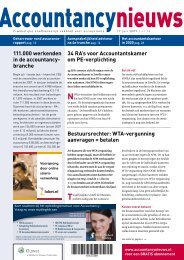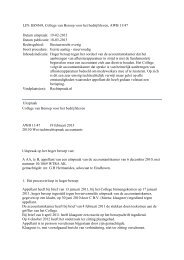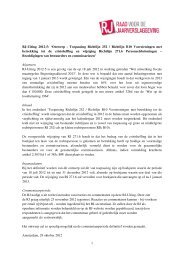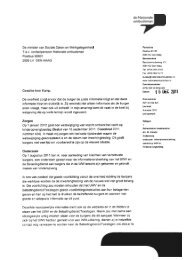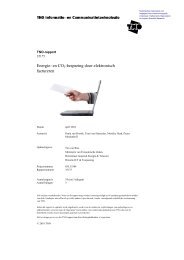Appetite for change - Accountancy Nieuws
Appetite for change - Accountancy Nieuws
Appetite for change - Accountancy Nieuws
Create successful ePaper yourself
Turn your PDF publications into a flip-book with our unique Google optimized e-Paper software.
Section 6While managing uncertainty, businesses remain hopeful• The requirements <strong>for</strong> business to report credible orverified greenhouse gas data are increasing. Thefoundation of climate <strong>change</strong> policy is credible data aboutgreenhouse gas emissions. Un<strong>for</strong>tunately, as businessexecutives have noted, governments do not have agood record of coordinating environmental policies. As aresult, companies may already submit emissions data inmultiple <strong>for</strong>mats <strong>for</strong> different purposes or regulations, evenwithin the same jurisdiction. To meet these obligationsefficiently, organisations are investing in good datamanagement systems.Businesses are actually hoping<strong>for</strong> more government action onclimate <strong>change</strong>• The lull in public interest is temporary. Public interest andengagement in climate <strong>change</strong> has lost out to concernabout the economy and jobs since the credit crunch inlate 2008. As economies come out of recession, climate<strong>change</strong> will increase in importance as a consumerissue. Many businesses are preparing by maintaininginvestments to strengthen their environmental credentialsand create new products and services.• Global warming of three or four degrees is possible.The scarcity of clear, long-term public policies combinedwith tight public purses will continue to inhibit investmentin low carbon infrastructure. This jeopardises the goal ofholding global warming below the two degrees Celsiustarget referenced in the Copenhagen Accord. Businessestrying to anticipate the potential risks of climate <strong>change</strong>are considering warming of three or even four degreesCelsius, particularly where markets, longlife assets orsupply chains are vulnerable to climate impacts, suchas in regions that are coastal, highly reliant on wateravailability or vulnerable to extreme weather events.Despite the rising tide of corporate action, business leadersworldwide want their governments to help lead the transitionto a low carbon economy. For over a decade, global CEOshave picked over-regulation as one of the top three threatsto their organisations. Yet, businesses are actually hoping<strong>for</strong> more government action on climate <strong>change</strong>. Thereis widespread support <strong>for</strong> all the major policy options –carbon taxes and regulation, in addition to incentives andemissions trading – and the support is strikingly consistentacross regions.This is an opportunity <strong>for</strong> government. Business leadersare eager not only to be involved in developing smartenvironmental policies, but also to see more policycoordination at the national and international levels.They remain hopeful that governments and business canhalt climate <strong>change</strong> together.46 <strong>Appetite</strong> <strong>for</strong> <strong>change</strong>. PricewaterhouseCoopers.



